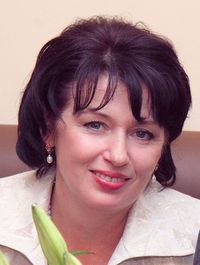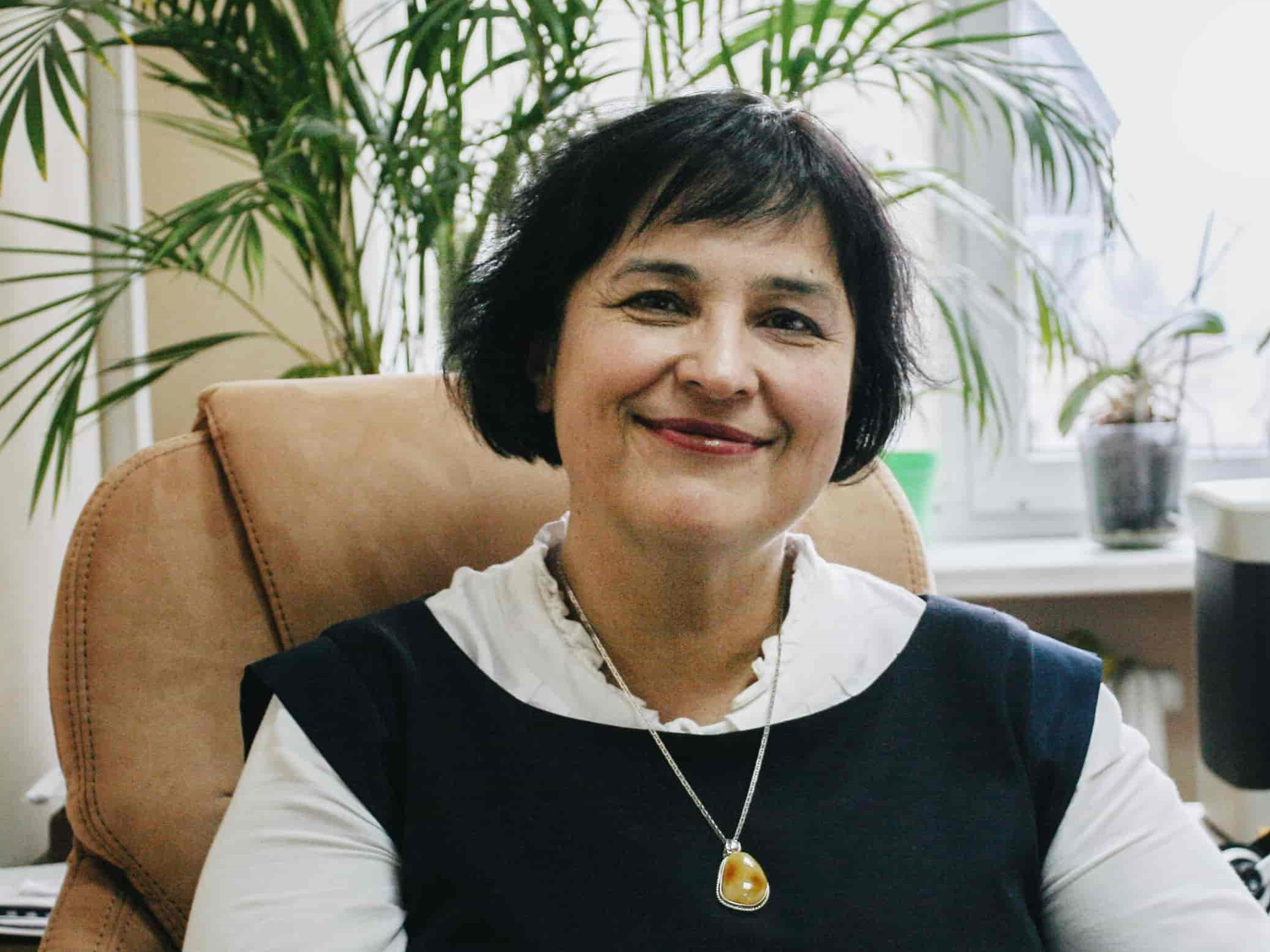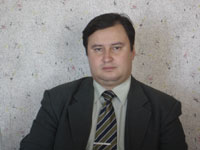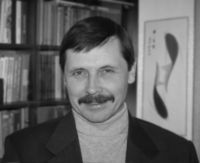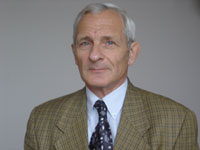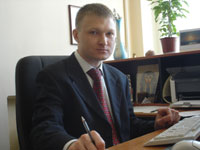DEPARTMENTS
Department for social issues of the labour market
Head of the Department: Lisogor Larysa Sergiivna, Doctor of Economics, Professor
Tel: + 38 (044) 238 08 21
Principal research areas and research outcomes:
- research into social issues of the labour market;
- comprehensive policy analysis of interaction of labour market and educational services;
- research into the issues of increasing the competitiveness of labour power, improvement of vocational training and skill development;
- methodology to assess the competitiveness level of labour power
- working out strategic directions of employment policy improvement, enhancement of infrastructural support to labour market development;
- recommendations regarding the updating of state employment policy which take into account structural transformation of labour market;
- identification of prospects of structural transformation in labour markets:
- forecast of changes in vocational qualification structure of labour power.
Department for human development studies
Head of the department: Makarova Olena Volodymirivna, Doctor of Economics, Senior Researcher
Tel: + 38 (044) 482 17 45
Subdivision for social risks in the sphere of employment of population
Chief of the subdivision: Zymbal Oleksandr Ivanovych, Doctor of Economics
Tel: + 38 (044) 486 31 33
Main research area: human development studies
Research outcomes:
- Rationale for the theoretical and methodological foundations of human development studies;
- updated Methodology for measuring human development of the regions of Ukraine is offered which includes:
- new principles for building the systems of indices to measure human development in the regions of Ukraine which take into account the quality requirement to statistical data and capability of dynamic comparison;
- new methodological approaches to measure human development with assessing its progress, rationing targets and determining weight of indicators by means of expert evaluation method of pair-wise comparison;
- new information collections to calculate regional index of human development;
- analysis of trends of human development, their stability and prospects in the regions of Ukraine
- determination and examination of consistent patterns and typology of human development, using methods of clustering, modeling and forecasting in particular;
- development of strategical directions of ensuring human development;
- monitoring of regional human development;
- monitoring and estimating of social policy, aimed at ensuring sustainable human development, including the issues of education, social protection, family and youth policy, gender issues, social investments, etc.;
- research of the potential of employment and social and labour relations in ensuring sustainable human development;
- monitoring of the achievements of the Targets of the Development of Ukraine for the Millennium.
Subdivision for social risks in the sphere of employment of population
The main direction of its work is revealing social risks in the sphere of employment of population.
Expected research outcomes:
- development and rationale of theoretical foundations of research of transformation in the sphere of employment of population and corresponding social risks;
- improvement of methodology of the social risks estimation in the sphere of employment and formulating the models of decision making in social policy with regards to regulation of the employment of the population;
- scientific rationale of the propositions to improve institutional, economic and organizational foundations of the social policy in regulation of the employment of the population;
- revelation of consistent patterns of transformation of macroeconomic and microeconomic variables in the sphere of employment formation and use of social potential of different forms of employment, concentration and differentiation of social risks;
- working out strategic directions of preventing the threats to the development of social potential in the sphere of employment and controlling social risks in employment policy;
- monitoring the wages, manpower cost, development of atypical and illegal forms of employment in Ukraine;
- monitoring the conformity of the national achievements in the sphere of employment with the requirements of the European Social Charter;
- analysis of the state social insurance system, reforming the social insurances funds and pension system in Ukraine in particular;
- expert support to the upgrading the collective agreement regulation in the sphere of employment.
Department for social and demographic statistics
Head of the department Sarioglo Volodymyr Georgiyovych, Doctor of Economics, Senior Reseacher
Tel.: +38 (044) 482 17 49
Main fields of studies:
- working out modern approaches to the integration of the statistical and economical models at macro and micro level, finding out constant patterns in demographic, social and socio-economic processes, working out and estimating the quality of social policy; examination of the sources and quality of information, necessary for modeling, development of methodological approaches to modeling and the models of actual processes in Ukraine;
- statistical evaluation of socio-economic indices and socio-demographic indices at regional and local level using up-to-date methods of mathematical and statistical modeling;
- working out methods of complex usage of data from different sources, micro level data in particular, aiming at the information support of decision making in the process of working out social, socio-economic and demographic policy on the basis of up-to-date methodology of their monitoring and evaluation;
- working out fundamentals of methodology of evaluation of data from different sources, quality of information sources, system of quality coefficients of data and methods of their measurement, approaches to ensuring the necessary level of quality of information support.
Main outcomes of the research:
- methodological base for complex application of methods of macro and micro modeling for studies of the changes in social and demographic processes, working out and evaluation of social and demographic and social and economic policy; methodological approaches to the integration of macro and micro models in order to analyze demographic, social and socio-economic processes;
- principles of formation and application of information support for micro-simulation modeling in Ukraine using information from different sources, up-to-date methods of preparing data regarding its quality;
- experimental representative population and households samples: methodological approaches to building static micro-simulation models and their application when studying social processes and working out social policy;
- pilot micro-simulation models for measuring the incomes of Ukraine households of labour migrants, forecast of the incomes of households regarding predictive macroeconomic indices and impact of the financial and economic crisis, death-rate analysis, ageing, marriage rates, etc. ;
- methodological base for forming samples, separate stages of data processing, estimation of indices of the integration of surveys for the system of state surveys of households in Ukraine: surveys of life condition of households, economic activity of population, agricultural activity of households in the rural area. Outcomes are introduced into the system of state statistics of Ukraine in the form of methodological provisions, methods, and automated procedures. Partially the results are used in the process of similar surveys conducted by the agencies of state statistics of the Republics of Armenia and Moldova, supported by international and nongovernmental organizations;
- methods of statistical fusion of micro-data of sample surveys and different levels of aggregation aiming at improving reliability of the evaluation of population quality indices and socio-economic indices.
- investigating the possibility of applying the methods of small territories for adjustments of poverty, employment and unemployment indices in Ukraine. The outcomes of the surveys are applied to working out methods and technologies for evaluating the indices of poverty in the regions of Ukraine, for monthly evaluating the indices of employment and unemployment, evaluating them at sub-regional and municipal levels.
Department for studying standards of life of population
Head of the department Cherenko Liudmyla Mykolaivna, Candidate of Economic Sciences, Senior Researcher
Tel.: +38 (044) 482 14 19
Main fields and outcomes of studies:
- Main trends of formation of standard of living of population and transformation in the components of standard of living:
- theoretical and methodological basis and conception of studies of standard of living of the population of Ukraine at the present stage was worked out;
- the methods of standard of living evaluation were worked out using multilevel approach, system of indicators of the standard of living was substantiated, factors for its formation were defined;
- current trends of formation of standard of living of population were studied and principal transformations were distinguished , which had happened under systemic crisis over the past two decades, in income, consumption, housing conditions and property characteristics of households.
- Personal income: level and structure; sources of formation and directions of use:
- series of income dynamics of households were built and dependency of their level on the type of the settlement, demographic and socio-economic distribution of households was detected;
- structural features and main sources of personal income against the type of terrain and household composition were detected.
- Income differentiation of population: decomposing by the income sources and certain socio-demographic groups:
- common trends and regularities of the processes of population differentiation by income and living conditions were identified;
- methodological approaches to the evaluation of differentiation of population by living conditions using consensus selection were worked out.
- Inequality by income and living conditions: basic components and manifestations; factors for their formation:
- theoretical basis was worked out regarding the definition of the essence of inequality and the features of its manifestation in Ukraine, by means of which socio-economic nature of inequality was substantiated; the specific features of formation and manifestation of inequality in Ukraine were determined;
- the basic characteristics of the components of economic inequality were determined; the dynamic changes regarding the impact of the separate sources of income to the total inequality of population were detected.
- Expenditures and consumer characteristics of households: expenditure pattern; consumption of different socio-demographic groups and family types; quantitative and qualitative indicators of consumption, basic group ratio of real and regulatory consumption of food products:
- theoretical basis was worked out for studying consumption of the population of Ukraine;
- the model of consumption was worked out which is adequate to contemporary socio-economic conditions of volatility and reformation of different spheres of social existence;
- the factors which impact consumer opportunities and consumer pattern of households were determined;
- time series of consumption of basic food products were built regarding the type of the households, region of residenсe, and income level.
- Living conditions of households: housing per capita, quantitative and qualitative housing characteristics, opportunity to improve housing conditions for different categories of population, accessibility of the social services for the residents of small settlements:
- opportunities to improve housing conditions for different socio-economic groups of population were evaluated;
- time series of quantitative and qualitative characteristics of existing housing stock were built regarding the types of the households, locality and region of residence;
- the dependence of the access opportunities were examined to the social services on the region of residence and size of settlement.
- Property characteristics and financial assets of households; provision with movable and real property; assets and loan obligations; investment potential of population:
- tendencies of formation of property characteristics of households were determined and their transformational changes were evaluated;
- the impact of financial assets and loan obligations of households upon the standard of living of people.
- Poverty and social alienation: monetary and nonmonetary aspects, profiles and factors of formation:
- methodological basis for determining and measuring poverty was worked out;
- specific features and phenomenon of poverty in Ukraine were detected; basic profiles and poverty risks of separate socio-demographic groups of population were determined;
- Social protection system and its impact on poverty and living conditions of socially vulnerable groups:
- methods of determining the stage of influence of social assistance system on the poverty situation were worked out; the analysis of the main programs of social assistance to people was made in order to evaluate their efficiency;
- the state programs of social support were assessed, namely: of social assistance, social exemptions, tax social exemptions regarding their influence on budget expenditures;
- the scenario of reforming some programs connected with modernization of the system of social assistance was prepared, namely: main directions of modernization of the system of social assistance; scenario of amendments to the programs of assistance to families with children, lower-income families and housing allowances; options of reforming the system of social benefits as a source of released funds for expanding targeted programs of social assistance;
- the calculation was made of the options of the change in cost of the state social programs (according to the scenarios of reformation) and their impact upon budget expenditures.
- Settlement and regional aspects of living standard of population, causes and effects of disparity in social and economic development of the territories:
- the theoretical substantiation was given to working out the model of income adjustment under the conditions of deep cost of living differentiation of regions;
- the analysis and assessment was made of the cost of living in the regions of Ukraine and purchasing power of the population incomes;
- the level of differentiation of regions across the cost of living was examined, they were arranged in accordance to the cost of living and purchasing power of the population incomes;
- the model was built of the impact of socio-demographic and economic factors upon the formation of the incomes of the population in regions;
- regulatory mechanisms of incomes under conditions of deep cost of living differentiation of regions were worked out;
- Modelling and forecasting of a standard of living of population and some of its aspects:
- the model was built of the impact of demographic and socio-economic factors upon the risks of poverty of the households in Ukraine;
- the forecast of division of population of Ukraine according to their incomes and, medium-term forecast (up to 2020) of the standard of living of population based on macro-level data were developed.
Department for migration studies
Head of the department: Pozniak Oleksiy Volodymyrovych, Candidate of Economic Sciences, Senior Researcher
Tel.: + 38 (044) 486 43 88
Principle spheres of research and its outcomes:
- Comprehensive analysis of migration situation in contemporary Ukraine:
- comprehensive migration zoning of the territories of Ukraine was accomplished which took into account both statistical and labour migration;
- the concept “migratory group” was substantiated, a system of criteria was formed to use them for identification of migratory groups;
- multidimensional classification of population according to migration attributes was worked out;
- assessment of the scale of “the soviet diaspora” in Ukraine was accomplished.
- Studies of labour migration in Ukraine:
- scientifically grounded assessment of the scale of external labour migration was accomplished and its tendencies were analyzed;
- analysis of the situation in the sphere of human trafficking was made;
- special features of the external labour migration of young people were discovered;
- the survey of Ukrainian people, working abroad, was conducted regarding the specific features of transfer behavior;
- an algorithm for calculating external labour potential of population was worked out.
- Revealing impact of migration upon demographic and demo-economic development:
- methodology of assessment of the impact of migration upon transformation of gender and age composition of population was developed;
- assessment of impact of the external labour migration upon number and composition of population of Ukraine was accomplished;
- new methodological approach to the assessment of incomes of labour migrants and money remittances was formed based on combined national and foreign statistical data;
- financial outcome of possible realization of entrepreneurial settings by the returned migrants was substantiated and evaluated;
- quantitative assessment of interaction between migration processes and constituents of human development was accomplished;
- main directions of theoretical substantiation of studies of the impact of infrastructural factors upon the migration course were worked out, based on the profound analysis of national and foreign scientific approaches;
- the index of conditional consumers/producers ratio was introduced into scientific use (which was calculated on the basis of the age level of production and consumption) as an integrated characteristic of economic value of age pattern of population; assessment of contribution of migration into the dynamics of index was accomplished.
- Forecasting migration of population:
- methodology for forecasting migration was worked out with assessing long-range characteristics of arrival and departure, and gender and age composition of migrants regarding the type and geographical destination of relocation;
- variant forecasts were worked out of migration of population of Ukraine (up to 2065) and regions (up to 2035) as a constituent part of demographic forecast;
- the role of migration in long-range demographic development was revealed;
- Research into ethnic composition of population and factors of its dynamic:
- classification of ethnic groups regarding the type of settlement and period of residence on the territory of Ukraine was developed;
- dictionaries of nationalities and languages to use in the processing the data of all Ukrainian census were worked out;
- ethnic differentiation of long-range birth rate, mortality rate and migration rate was evaluated;
- methodology of forecasting ethnic-demographic development was improved, forecast of the ethnic composition of the population of Ukraine up to 2026 was prepared.
- Research into immigration to Ukraine and integration of immigrants:
- a number of special sample surveys of students of higher education institutions in Ukraine regarding the immigrants from developing countries were accomplished, results were analyzed;
- on the basis of the results of special surveys of the foreign students of higher education institutions located in Kyiv, reasons of their migration to Ukraine, problems of adaptation and integration into the Ukrainian social medium were revealed;
- the extent of replacement immigration was evaluated which is necessary for supporting permanent size of the population of Ukraine;
- recommendations for policy formation in the sphere of migration and integration of immigrants were worked out.
- Assessment of migration in the capital of Ukraine:
- the assessment of the position of non-resident labour force on the labour market of Kyiv was made using the results of a special survey;
- sample survey of the students of Kyiv’s higher educational institutions was carried out regarding the relations between Kievites and newcomers in the students environment; the analysis and generalization of the results were made;
- the methodology was worked out and scientifically grounded assessment of Kyiv’s population was made (actual, daytime, and night) which is based both upon the data regarding the standard residential population of the capital city from state statistics and information from other sources;
- the forecast of migration trends of Kyiv population up to 2025 was prepared.
Department for studying demographic processes and demographic policy
Head of the department : Kurilo Iryna Oleksiivna, Doctor of Economics, Senior Researcher
Tel.: + 38 (044) 236 32 05
Main directions and outcomes of the research:
-
The newest tendencies of generative activity, birth rate, its dynamics and structural characteristics:
- the meaning and role of generative activity was substantiated in the system of relationship regarding the reproduction of population;
- tendencies in birthrate and structural parameters of its current model in Ukraine were studied comprehensively;
- regional peculiarities of the level and structural characteristics of the birthrate were determined;
- the new features of fertility behavior among some socio-demographic groups in the population were detected;
- the factors of distribution and structural peculiarities of illegitimate birth in Ukraine were studied;
- consistent patterns in changes with the model of birthrate in retrospect within Ukraine and in the countries of Europe were determined.
Factors of birthrate and working out hypotheses regarding further changes in birthrate for building a forecast:
- factors of changes in birthrate and their mechanism were studied, regarding the specific nature of different countries and regions;
- the mechanism of influence of a number of general and specific factors on generative activity in Ukraine was revealed;
- the specific nature of correlation between economic and reproduction activities was substantiated (of women, in the first place);
- interrelations of socio-economic status and reproduction activity were studied;
- an analysis was made of interdependence between birthrate and matrimonial processes;
- the potentiality of increasing birthrate in Ukraine was identified.
Market of social services with early childhood education, system of pre-school education:
- the system of social services of child care and education was studied comprehensively;
- the areas for improvement in the conditions of generative activity in the system of pre-school education were suggested.
Characteristics of matrimonial sphere of population reproduction:
- the matrimonial structure of population of Ukraine and its age groups was examined using census and representative sample socio-demographic surveys results;
- the features of the current model of mating of population of Ukraine: age characteristics, development tendencies and regional peculiarities, were determined;
- divorce rate of the population was studied comprehensively, including: modern condition dynamics and regional features;
- principal processes of matrimonial structure formation of the population were studied.
Transformation of the institution of marriage, its causes and demographic outcomes:
- theoretical and methodological foundations studying the institution of marriage in contemporary Ukraine were elaborated;
- regularities in changes of marriage models in Ukraine were found out in retrospect;
- transformation of the institution of marriage and its functions in contemporary Ukraine was studied;
- specific features of the nucleation process with the families in Ukraine were revealed;
- spreading of the new forms of mating and motivations for choosing certain forms of marriage by the population of different age groups were studied.
Challenges and risks of life activity of a Ukrainian family concerning socio-transformational processes:
- socio-demographic risks of the development of a Ukrainian family and their causes and outcomes were determined;
- factors of expanding social orphanhood in contemporary Ukraine were identified, the scale of the problem and its economic and demographic outcomes were revealed;
- directions for minimizing the risks with the development of an Ukrainian family by means of socio-demographic policy were proposed.
Family and pronatalist policy in Ukraine, foreign experience of policymaking:
- conceptual basis and areas for realization of family policy were studied;
- the experience of the leading European countries regarding the principles of the family, pronatalist policy and its different tools were studied;
- guidelines for further improvement and development of the family policy in Ukraine were developed.
Demographic aging and its features in Ukraine:
- dynamics and differentiation of the level of aging in Ukraine was studied by several indicators; the rank of the country in the world was evaluated by the different indicators of aging of population;
- regional features of population aging were determined;
- the state of implementation of Madrid International Plan of Action on Aging by Ukraine was analyzed comprehensively and compliance with United Nations Principles for Older Persons in this country was studied;
- gender features of marriage and family structure of older population were determined;
- degree of adaptation of different spheres of socio-economic life in Ukraine to the progressive aging of population was evaluated;
- the effect of existing social perception of old age on the realization of measures to support aged people was substantiated;
- the ways to improve and develop the policy for older people in Ukraine were identified.
Department for demographic modelling and forecasting
Head of the department: Gladun Oleksandr Mykolaiovych, Doctor of Economics
Tel.: + 38 (044) 486 02 74
Principal areas of research and its outcomes
- Trends of demographic processes in Ukraine in 1900s – 2010s:
The methodology was worked out and reconstruction of demographic dynamics of Ukraine was accomplished for the period of 1950s through the beginning of 21st century as information base for in-depth transverse and cohort analysis of demographic processes in Ukraine and study of their volatility. Dynamics of population, trends of demographic processes in Ukraine for the period of 1950s through the beginning of 21st century were correlated to the phenomenon of demographic waves as a symptom of volatility and their consequences for human development were determined. The main socio-demographic events happened before the contemporary age-sex structure were analyzed on the basis of reconstruction of demographic dynamics.
- Forecasting of medical and social consequences of aging of population in Ukraine:
Main tasks of public health care were defined under progressive aging of Ukrainian population.
- Research into the correlation between demographic and human development:
Connection was proven between the features of demographic development in developed countries, such as low birth-rate, low death-rate, high life interval, with human development and expanding the freedom of choice, in the sphere of people’s own reproduction, in particular. The consequences of population explosion in the developing countries are impossible to overcome without human development, expanding rights and opportunities for women, and overcoming poverty. Sustainable human development will be ensured by equitable distribution of resources and responsibilities across generations and mitigation of inter-generation inequality.
- Transformation of death-rate of population of Ukraine within social modernization and epidemiological transition:
The character of long-term shifts in the course of mortality, their conformity with the modernization trends and current mortality models were determined on the basis of combination of quantitative assessment of the shifts with determination of their qualitative features and conformity with general algorithm of social modernization. The incompleteness of the mortality modernization process in Ukraine was proven. Reasons were determined for lagging reduction in mortality and increase of life expectancy in Ukraine comparing to the developed countries, which are: low inclination of the population of Ukraine to adhere to the healthy life style, un-readiness of the society and the system of healthcare to fight effectively against the risks of chronic non-contagious diseases and realization of proclaimed principle of prophylaxis, including overestimation of both medical technologies and pharmaceutics, underestimation of social and cultural prerequisites, a lack of awareness of responsibility for their own and their children’s health, and lack of sensible health choices.
- Impact of asocial phenomena upon the state of health and mortality of population:
The impact of asocial phenomena upon the state of health and mortality of the population of Ukraine was studied, principal factors of expanding of psychoactive substances and specifics of their manifestations were determined, the assessment of demographic losses, caused by alcohol abuse, smoking and mortality from AIDS was accomplished.
Department of social infrastructure
Head of the department : Novikov Valerii Mykolaiovych, Doctor of Economics, Professor
Tel.: + 38 (044) 486 03 34
Principal areas of research and its outcomes:
Main research area of the department: research into the (problems of) development of social infrastructure.
-
Outcomes of the research:
– conceptual basis of the development of social infrastructure insuring humanitarian development of the society was determined, which included: human development, improvement of life quality and equitable distribution of resources in conformity with ethical principles:- working out of institutional mechanisms and organizational measures to restructure the social infrastructure on the basis of arranging and decentralizing population service system;
- conceptual framework was improved; general scientific interpretation was given to the economic mechanism of social infrastructure, which includes four elements connected with the state, commercial, corporate and state-corporate approaches to implementation of the social policy;
- concept of multi-channeled financing of the social infrastructure was developed; through consideration of the international practice it was suggested to introduce special (marked) taxes and implement the system of extra-budgetary state funds with fixed sources of income;
- determination of the directions of investment into the development of the branches of social infrastructure;
- working out the fundamentals of bank loans to people to make the service of the social infrastructure accessible to them;
- modelling of inter-budgetary relations with strengthening the incentive mechanisms of regional development of social infrastructure;
- identifying the directions for reforming the budgetary financing of healthcare system by the ways of providing medical care; organizational and economic priorities in developing primary health care;
- research into the problems of formation and functioning of the tourism and recreation service based on the international experience of managing and taxing the tourist activities;
- forecasting the dynamics of paid services at the institutions of social infrastructure;
- perfecting the system of budgeting on the basis of the program-target method;
- enhancement of the functioning of social welfare institutions;
- working out the long-term scenario for the development of the social infrastructure, including: health care, education, culture, tourism, housing and public utility sectors.
Additional capabilities of the researchers of the department of social infrastructure:
Expert and analytical services:- conducting pilot projects in the regions of Ukraine in cooperation with local administration regarding the improvement of state and local social programs management;
- preparing annual monitoring in cooperation with state and local administration “Socio-economic monitoring of the potential of Ukraine socialization. Assessment. Forecast. Propositions”;
- both interregional and regional level research and analytical studies into the functioning and financing of the education, health care, culture, recreation and tourism, housing and public utilities institutions;
- preparing subject surveys, selecting scientific, informational and statistical data with regard to functioning and development of social infrastructure branches;
- market research into the market of education, health care, culture and recreation services;
- evaluation of provision of population with the services of the institutions of social infrastructure;
- improvement of legislation on development of the social infrastructure;
- research and analytical support of reforming the social infrastructure on the basis of European and world experience;
- computer modelling of remuneration;
- expert evaluation of the potential of regions development on the basis of improving the mechanism for providing intergovernmental transfers.
Department for studying issues of social capital formation
Head of the department: Zaiats Tetiana Anaytolivna, Doctor of Economics, Professor
Tel.: + 38 (044) 486 03 97
Principal areas of research and its outcomes:
Formation, maintenance and development of the social capital of the country and its regions:
- theoretical and methodological basis was worked out to form, maintain and develop the social capital under conditions of socio-economic instability and cyclic development of the economy;
- the nature of subjective-objective relationship of social capital was determined, as well as its economic properties, structural characteristics and institutional characteristics;
- specific features of formation of people capital were determined, as well as mechanism of its development and perspectives of its strengthening under the conditions of economic transformations;
- methods to evaluate the process of formation of human capital were proposed in terms of their balance;
- the system was determined from the dominant functions of the social capital under present-day socio-demographic transformations.
Modernization of the social and industrial relations for increasing social capital:
- classification of the main forms of modernization of the social and industrial relations was accomplished, and the correlation between them and possible socio-economic effects were determined;
- prospective lines of modernization of the social and industrial relations were substantiated, as well as their dependence on the main forms of modernization;
- innovative changes resulting from transformations in developing social and industrial relations were revealed;
- an up-to-date mechanism of ensuring modernization in the field of social and industrial relations was evaluated;
- methods were worked out to evaluate integrally the potential of modernization of the social and industrial sphere of the regional economic systems;
- conceptual framework of successful modernization of social and industrial relations with regard to the interests of all parties was substantiated;
- principles and regular patterns of productive modernization of social and industrial relations, directed to achieving the objective of social development were determined;
- the effective mechanism of modernization model of social and industrial relations under socio-economic instability was suggested;
- the model of social and industrial relations with determined principal targets, directions, tools and expected outcomes was worked out.
Ensuring productivity of labour as economic basis for strengthening social capital
- theoretical and methodological foundations were worked out of productive labour activity; main incentives and disincentives determined;
- methodological foundations for building the up-to-date model of productive labour activity were substantiated;
- latest transformational changes in the process of productive labour activity formation were revealed: ways to optimize them were substantiated;
- methodological foundations were worked out for integral estimation of productivity of labour activity
- the forecasting algorithm for the changes in productivity was determined; conceptual framework of its growth was determined;
- the effective mechanism was worked out and strategic directions of ensuring productivity of labour activity under difficult socio-economic conditions were substantiated.
Social responsibility of economic agents in forming civil society:
- the paradigm of social responsibility (based on considerations of initial behavioral conditions of economic development) was substantiated;
- the model and tools of forming a socially responsible individual as the agent of economic interaction were developed;
- priorities and areas of activating civil society in Ukraine as the agent of social responsibility, were determined;
- strategic directions were proposed for the state policy regarding the insurance of the social responsibility of economic agents.
Social potential of rural settlement: problems and solutions:
- methodological foundations for the research into and estimation of the rural settlements under socio-economic instability were accomplished;
- the effective mechanism of protection and development of the socio-demographic, labour and structural potential of the rural settlements in the country regions was substantiated;
- the conceptual model of stabilizing rural settlement potential by the criteria of its protective features, was developed;
- prospective lines for the state policy regarding the development of the rural settlements were determined.




